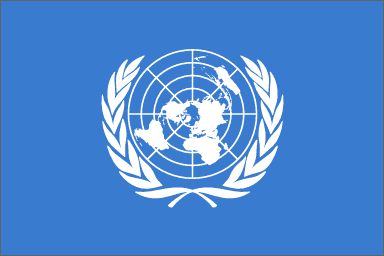
The UN Millennium Development Goals
'Millennium' means one thousand years, 'development' means the way the world grows, and of course 'goals' are the things that we aim to accomplish. The United Nation's Millennium Development Goals (MDGs) are the most important things we, as a world, need to aim for right now. All of the UN countries have agreed to them. The goals center on poverty, and therefore health, and education, but also include goals for women's rights (gender equality), the environment, and how different countries deal with each other's special needs. The goals are to be met by 2015.
The idea of the goals started with the 'United Nations Millennium Declaration' published on the 18th of September, 2000. The declaration says that for the sake of humanity, we must also consider the needs of countries other than our own because we are more and more connected and depend on each other. It also says the central challenge we face today is to make globalization a positive force. At present, globalization is only making the rich richer while not helping the poor very much. In other words, it is a negative force.
Only 50 years ago, most of the people in the world were living in poverty and didn't have enough food but the situation has gotten much better. The world continues to become a better place but only with more cooperation and change can we make a world that is truly humane and safe. We must change the way we do things. In the words of Kofi Annan, the former Secretary-General of the United-Nations, "We will have time to reach the Millennium Development Goals.... but only if we break with business as usual."
The goals are listed below:
Goal 1
Eradicate extreme poverty and hunger.
(Less people who live on less then 1 dollar a day. Less people starving.)
Goal 2 Achieve universal primary education.
(Elementary school for all children everywhere.)
Goal 3 Promote gender equality and empower women.
(More women that go to high school and beyond.)
Goal 4 Reduce child mortality.
(Less children that die before the age of 5.)
Goal 5 Improve maternal health.
(Less pregnant mothers that die during birth or before.)
Goal 6 Combat HIV/AIDS, malaria, and other diseases.
(Stop AIDS and other diseases that spread.)
Goal 7 Ensure environmental sustainability.
(Protect nature, provide safe drinking water, and improve slums.)
Goal 8 Develop a global partnership for development.
(A fairer world economy.)
(Download Gap Fill)
(Less people who live on less then 1 dollar a day. Less people starving.)
Goal 2 Achieve universal primary education.
(Elementary school for all children everywhere.)
Goal 3 Promote gender equality and empower women.
(More women that go to high school and beyond.)
Goal 4 Reduce child mortality.
(Less children that die before the age of 5.)
Goal 5 Improve maternal health.
(Less pregnant mothers that die during birth or before.)
Goal 6 Combat HIV/AIDS, malaria, and other diseases.
(Stop AIDS and other diseases that spread.)
Goal 7 Ensure environmental sustainability.
(Protect nature, provide safe drinking water, and improve slums.)
Goal 8 Develop a global partnership for development.
(A fairer world economy.)
In an age when human beings have
learned the code of human life and can transmit their knowledge in
seconds from one continent to another, no mother in the world can
understand why her child should be left to die of malnutrition or
preventable disease. Never before have the leaders of so many nations
come together in a single assembly. This is a unique opportunity and
therefore, a unique responsibility. No one can understand why the soil
their parents tilled has turned to desert and their family is left
hungry. We need to decide our priorities so that that in the future
those priorities are reflected in clear and prompt decisions leading to
real change in people's lives. They expect you to work together as
governments, and they expect you to work together with other
institutions profit and non-profit, public and private where human
beings join hands to promote their ideas and their interests. People
know that these challenges cannot be met by one country alone.
That is why we are here. They look to you to protect them from the
great dangers of our time. That, my friends, is what the peoples expect
of us. Let us not disappoint them.
-Former
Secretary General of the United Nations, Kofi Annan
(Download Gap Fill)
